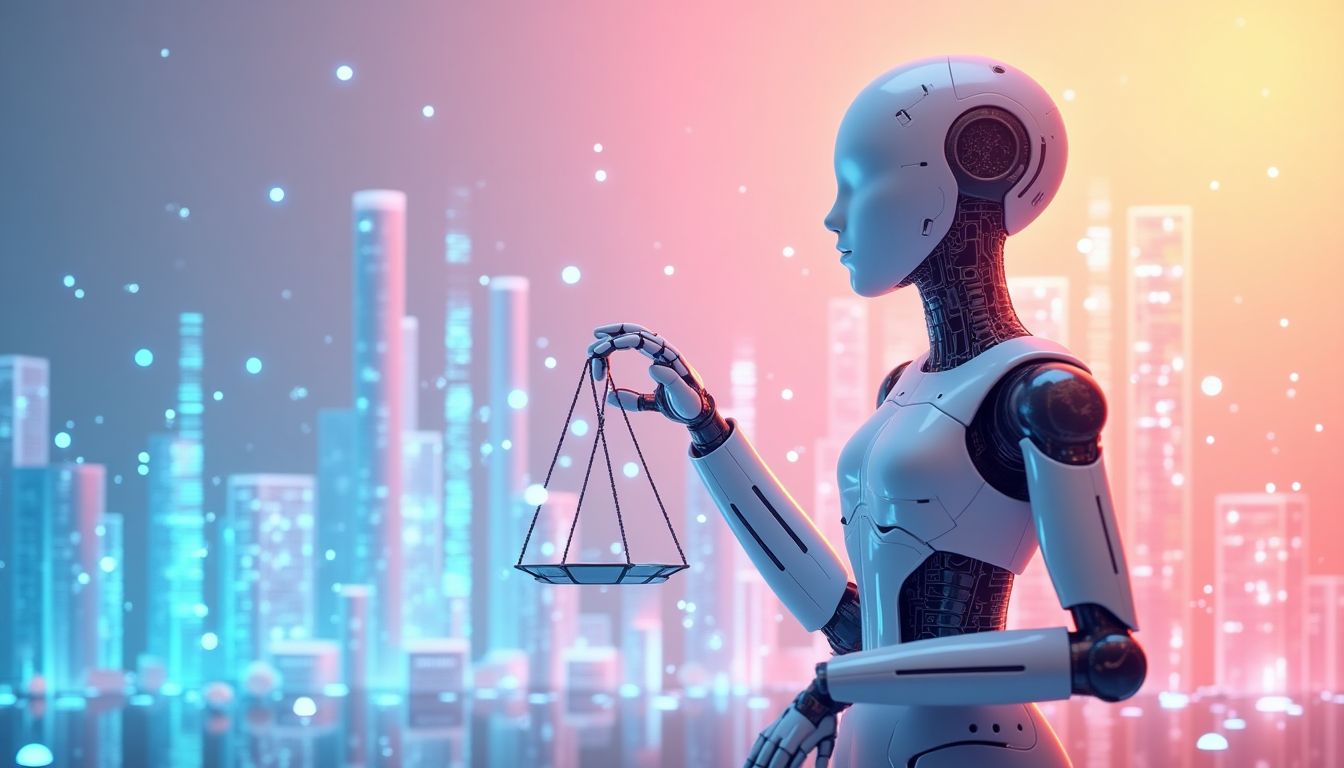Introduction: The Coming Age of Machines in Governance
We cannot solve our problems with the same thinking we used when we created them. – Albert Einstein. This quote resonates strongly in today's political landscape, where outdated thinking often leads to ineffective governance. It suggests that the solutions we seek in politics—where efficiency and impartiality seem like mere fantasies—may lie beyond the traditional human-led approach. In a world overwhelmed by political polarization and the thicket of bureaucratic red tape, the idea that artificial intelligence (AI) might step in to take over the reins of governance piques curiosity and raises eyebrows.
Could we be on the brink of a monumental shift in how we view our political systems? The thought of algorithms stepping into the roles traditionally held by human leaders invites both excitement and trepidation. What if the very machines we create to serve us could replace the politicians who often serve themselves? This notion is not just about replacing faces in suits; it's about redefining the essence of governance itself. As we explore whether AI could genuinely replace politicians, we open a Pandora's box filled with questions about efficiency, bias, ethics, and public trust.
Renowned thinkers like Malcolm Gladwell, who discusses the power of choice and the pitfalls of decision-making, and Robert Putnam, who explores the fabric of social trust, offer critical insights that relate closely to this discussion. Their work invites us to question whether AI might not just fill a functional gap but could also lead us to rethink the fundamental values of democracy.
Autonomous Governance refers to political systems where artificial intelligence (AI) operates decision-making processes to enhance efficiency, transparency, and fairness in public administration, potentially reducing human flaws and biases. The integration of AI in governance raises important questions about ethics and the future of democracy.
1. The Case for AI in Politics: Efficiency and Impartiality
Let’s face it: political systems are often as slow as a snail on a weak Wi-Fi connection. When it comes to making decisions, traditional governance often stumbles through a labyrinth of bureaucratic delays, tangled regulations, and, let's admit it, a fair amount of winging it. The truth is, inefficiency reigns supreme in many government operations. According to a report from the World Bank, governments can waste up to 30% of public expenditure on ineffective practices and corruption. That’s a lot of taxpayer money going down the drain!
1.1 The Inefficiency of Traditional Governance
Take a moment to consider your local city's zoning laws. The bureaucracy involved in changing a single policy feels like trying to get a cat into a bathtub. In many cases, proposals swirl in a vortex of committees, public hearings, and endless revisions, resulting in delays that can stretch on for years. These inefficiencies not only frustrate citizens but also hinder necessary progress.
1.2 The Promise of AI-Powered Efficiency
Now, what if we introduced AI into this mix? AI systems can process vast amounts of data in mere seconds, analyze trends, and predict outcomes with a level of accuracy that would make even the best-trained bureaucrat blush. Cities like Barcelona have already started implementing AI technology in urban planning, significantly speeding up decision-making processes. By utilizing AI tools, governments can streamline resource allocation, enhance productivity, and ultimately lead to a more responsive and responsible administration.
Imagine a world where the wheels of government roll smoothly, making life easier for the average citizen. Yes, there are challenges and ethical considerations, but the potential benefits of AI in governance offer a tantalizing glimpse of a more efficient future.
2. Bias in Political Systems: Can AI Offer a Solution?
Bias is a troublesome word in politics. It’s that unwelcome acquaintance who shows up uninvited and sticks around longer than you’d like. From race to gender to ideology, political systems can be a minefield of bias. With our ever-evolving technological advancements, we must ask ourselves: could artificial intelligence step in to help level the playing field? Let’s dive into how AI potentially offers a beacon of hope through its impartiality in decision-making.
2.1 The Nature of Bias in Human Decision-Making
At its core, human decision-making is messy. We all have feelings—sometimes they guide us to make smart choices, and other times, they lead us astray like a lost cat in the rain. Decisions influenced by emotions, stereotypes, and social pressures are often anything but fair. According to a study by the American Psychological Association, stress can lead to impulsive and biased decisions. Imagine every politician making choices on shaky ground because they didn’t get enough sleep last night! What if AI could analyze decisions objectively, without that pesky human bias getting in the way?
2.2 Designing Unbiased AI Systems
Designing AI systems that can be unbiased is like trying to bake a cake without the sugar: it’s not an easy task! However, with the right ingredients, it’s certainly possible. For AI to operate impartially, developers must ensure they utilize diverse datasets. This means training the AI on information from different demographics, situations, and experiences. As noted by OpenAI, using varied data helps reduce the chances of the AI picking up harmful biases from our human world. If we can create AI that acknowledges different viewpoints, maybe we can finally take a step back from the hopscotch of biased governance!
3. The Role of AI in Legislative Processes
Picture this: it’s a busy day in the legislative chamber, and the folks inside are swimming in paperwork trying to draft new laws. Now imagine if a friendly AI could step in to assist! From drafting legislation to analyzing potential impacts, artificial intelligence has the potential to supercharge the law-making process. Let’s explore just how this futuristic assistant could transform legislation.
3.1 AI-Assisted Legislative Drafting
Drafting legislation requires a unique blend of creativity and practicality, almost like cooking a gourmet meal. You need the right spices, timing, and a pinch of common sense. AI can help chefs—uh, I mean lawmakers—by providing insights to write more effective bills. Tools like text-analysis algorithms have already been used to assist lawmakers in drafting clear and comprehensive legislation. AI can quickly analyze previous bills, highlight key points, and even suggest potential improvements. Think of it as a sous-chef guiding you through the complex dish of legislative work.
3.2 Predictive Analytics in Legislation
Now, imagine an AI that not only assists but also predicts outcomes! Sounds like something out of a science fiction movie, doesn't it? Well, it’s closer to reality than you might think. Predictive analytics helps lawmakers assess how new laws may impact society and the economy. For instance, Pew Research Center has noted that some states use AI to predict crime rates and economic changes resulting from certain laws. Instead of diving headfirst into the unknown, lawmakers can use data-driven insights to steer their ships. This could revolutionize the decision-making processes by turning guesswork into a smooth sailing experience!
4. Ethical Considerations: The Morality of AI Governance
As we explore the idea of letting machines govern, ethical questions come to the forefront. Can we really trust artificial intelligence to make the right decisions? Who is held responsible if AI fails? These questions lead us to examine the morality of AI governance and the critical issues surrounding accountability and public trust.
4.1 Accountability and Transparency
One of the main ethical dilemmas about AI governance involves accountability. If an AI system makes a bad decision, who is responsible? Is it the programmers, the government officials who implemented the AI, or the AI itself? Here are some important points to consider:
- Decision Origins: We need to track where decisions come from, especially if AI is involved.
- Clear Regulations: Governments must put strict rules in place to ensure AI acts responsibly.
- Human Oversight: Even with AI in power, human oversight is crucial to keep decision-making ethical.
By focusing on transparency and setting rules, we can help ensure AI systems operate ethically. This approach can build public trust, as people will feel more confident about machines making decisions affecting their lives.
4.2 Public Perception and Trust in AI
The public's acceptance of AI in governance is vital for its success. If people don’t trust AI, it's unlikely to be implemented effectively. Survey data suggests that many are hesitant about AI decision-making due to fears about bias and accountability. Studies show that:
- Over 60% of people worry AI will replace human jobs.
- Many feel unsure about the ethics of AI-driven governance.
- Public education on AI's benefits is critical to building trust.
To raise awareness and trust, government programs should educate citizens on how AI works and its potential advantages in governance. Only then can the public embrace this technological shift.
5. Global Perspectives: Successful Implementations and Lessons Learned
Looking around the world, some countries and cities have already started using AI in their governance systems. These examples are teaching us valuable lessons about the benefits and challenges of AI in politics. Let's explore a few notable case studies.
5.1 AI in Government: Case Studies
Several locations have successfully integrated AI to improve their governance, showcasing the potential of technology:
- Singapore: The Smart Nation initiative includes AI solutions to streamline public services, making tools like public transport and healthcare more efficient.
- Estonia: Known for its e-Governance system, Estonia uses AI for digital identity verification, revolutionizing how their citizens interact with government services.
- Los Angeles: The City implemented AI in their Department of Transportation to optimize traffic patterns, resulting in better traffic flow and reduced congestion.
These case studies illustrate the promise of AI for enhancing governance efficiency while providing a roadmap to address obstacles such as public skepticism and data privacy concerns.
5.2 Future Trends and Predictions
Looking ahead, we can predict several trends regarding AI in governance:
- Increased Collaboration: More partnerships between tech companies and governments will shape AI policies.
- Focus on Ethics: We will likely see a rise in ethical guidelines and regulations concerning AI use in public sectors.
- Public Engagement: Governments may increase efforts to engage the public in discussions about AI to cultivate trust and ease fears.
Research indicates that as AI becomes more prevalent, we will see a transformation in how society views governance. The combination of human intuition and AI's analytical power could lead us into an exciting new era of governance.
6. AI Solutions: How Would AI Tackle this Issue?
To address the significant challenge of potentially replacing politicians, we can focus on several key functionalities that AI could bring to enhance governance. This strategic framework aims not only to innovate the political landscape but to ensure that ethics and human rights remain at the forefront of decision-making. By leveraging machine learning, data analytics, and public sentiment, we can build a resilient governance model poised for the future. Here’s how.
The framework would involve:
- 1. Identifying core governmental functions that require decision-making.
- 2. Developing algorithms capable of processing vast datasets to inform decisions.
- 3. Establishing clear accountability parameters and ethical guidelines for AI operations.
Here’s a breakdown of our approach:
6.1 Identifying Core Functions
To initiate the process, we must first identify which governmental functions can be augmented or enhanced through AI technology. Areas include:
- Resource allocation – effectively using limited funds and materials.
- Public health responses – assessing outbreaks and managing healthcare facilities with data-driven insights.
- Environmental management – utilizing AI for better resource management and sustainability initiatives.
- Voting and electoral processes – improving transparency and engagement through AI tools.
6.2 Developing Advanced Algorithms
Next, we can focus on creating advanced algorithms designed to handle vast datasets, analyzing historical trends, demographic shifts, and public opinion. This involves:
- Implementing predictive analytics to foresee societal needs and challenges.
- Utilizing natural language processing (NLP) techniques to monitor social media for public sentiment.
- Ensuring that algorithms are adaptable and regularly updated to enhance their efficacy.
These technologies are crucial for staying ahead of the curve and adapting to an evolving social landscape.
6.3 Establishing Ethical Guidelines
With great power comes great responsibility, and this is especially true for AI in governance. The importance of ethical programming cannot be overstated. Measures must include:
- Creating a diverse panel comprising ethicists, data scientists, and community members to oversee AI implementation.
- Developing an ethical charter that mandates transparency in AI decision-making processes.
- Implementing accountability frameworks ensuring AI’s actions can be traced back and understood, preventing obfuscation of responsibility.
Actions Schedule/Roadmap (Day 1 to Year 2)
Day 1: Feasibility Study Initiation
Kick off with a comprehensive feasibility study involving data scientists, political theorists, and ethicists from top institutions such as MIT and Stanford to gauge current public sentiment, technological capacity, and ethical considerations.
Day 2: Stakeholder Engagement
Host workshops in collaboration with organizations like Urban Institute, technologists, and public representatives to discuss AI’s potential in governance, gathering insights and fostering collaboration.
Week 1: Formulate Research Teams
Create interdisciplinary teams comprising computer scientists, social scientists, legal experts, and AI ethicists from research hubs such as Brookings Institution to address various facets of AI in governance.
Week 2: Dataset Compilation
Compile diverse datasets from public and private sectors to train machine learning algorithms, ensuring representation across demographics and socio-political contexts. Partner with institutions for responsible data sourcing.
Month 1: Pilot AI Programs in Local Governance
Implement initial pilot programs in local governments, focusing on limited decision-making areas (e.g., resource allocation) to test algorithm responses while collaborating with local tech firms.
Month 2: Review and Adjustment
Analyze pilot results, addressing any inefficiencies or biases detected in decision-making processes, adjusting algorithms based on real-world feedback.
Month 3: Expand Pilot Projects
Broaden the scope of pilot projects to include more complex decision-making scenarios like public health management, integrating feedback from local community stakeholders and refining the systems.
Year 1: Establish An AI Governance Framework
Formulate a comprehensive framework outlining how AI will be integrated into governance while addressing challenges and proposed regulatory measures, ensuring public engagement in the process.
Year 1.5: National AI Governance Testing
Begin national-level testing of AI governance systems, utilizing advanced algorithms to assist in legislative drafting and public policy analysis, with extensive public consultation.
Year 2: Phase Rollout Based on Findings
Based on findings, develop a phased implementation strategy, addressing concerns and recommendations from stakeholders and the public. You can create a roadmap that enables gradual integration at various governmental levels.
Conclusion: Embracing the Future of Governance
As we stand on the precipice of transformation, the role of AI in governance presents us with a unique opportunity. It's more than just about replacing human politicians; it's an invitation to rethink our entire political landscape. Imagine a world where algorithms increase transparency, impartiality, and efficiency in decision-making processes, free from the shadows of bias and inefficiency. However, this exciting innovation must be approached with caution and integrity. Ethical considerations, public sentiment, and accountability should lead the charge. As AI continues to develop, the symbiosis between human insight and technological prowess can define our future governance. But we must ask ourselves: Are we ready to embrace this change, and how can we ensure it's done right? Share your thoughts in the comments below and join the conversation about the future of governance.
FAQ
1. Can AI really replace politicians?
AI has a lot of potential to help in many areas of government. It can make certain decisions faster and more accurately than humans. However, it's unlikely to fully replace politicians. Why? Because politics often requires empathy, morality, and the ability to understand people’s emotions and needs. These human qualities are hard for machines to replicate. Think about it: who would you trust to make critical decisions that affect your life? A robot or a person with real feelings?
2. What are the main challenges of implementing AI in governance?
Implementing AI in governance does come with several challenges:
- Ethical concerns: People worry about the morals of letting machines make significant decisions.
- Data privacy issues: Using AI means handling a lot of personal and sensitive information.
- Public acceptance: Gaining trust in AI systems can be difficult; people need to feel comfortable with technology making critical choices.
3. How could AI improve transparency in governance?
Transparency is essential for trust in government. AI can help make decision-making clearer by:
- Analyzing data: AI can process large amounts of information quickly to reveal insights.
- Access to information: By providing easy access to decision-making processes, the public can better understand how and why choices are made.
This not only helps citizens stay informed but also allows them to hold their leaders accountable.
4. What role does public sentiment play in AI governance?
Public sentiment is crucial when it comes to AI in government. If people don’t trust AI systems, they won’t support their use. Surveys and studies have shown that trust in technology can greatly impact its effectiveness. It's like voting: if you don’t believe in a candidate, you won’t vote for them. For AI to be successful, it needs to earn the trust of the community.
5. Are there any current examples of AI in governance?
Yes, several cities and countries are already using AI to improve their governance. For example:
- Barcelona: The city uses AI to optimize traffic management and public transportation.
- Singapore: AI helps with resource allocation and predictive analytics to enhance public services.
- Helsinki: The city employs AI for urban planning, ensuring data-driven decisions for community needs.
These examples show that AI can lead to more efficient governance when implemented correctly.
6. What ethical considerations are there for using AI in politics?
When using AI in any area of governance, ethical considerations are fundamental:
- Accountability: Who is responsible if something goes wrong? It's vital to establish clear lines of accountability.
- Bias: AI systems can inadvertently learn and replicate existing biases. Ensuring they are fair is crucial.
- Transparency: If AI is part of decision-making, the processes must be understandable to the public.
Addressing these ethical dimensions can foster greater public trust and acceptance.
7. How can AI assist in the legislative process?
AI has the potential to enhance legislative processes significantly. It can:
- Draft legislation: AI tools can help lawmakers write better, clearer laws, reducing the time spent on revisions.
- Analyze impact: It can use predictive analytics to study how new laws might impact society and the economy.
These capabilities might lead to more informed and efficient decision-making in government.
8. Why is diversity important in AI systems?
Diversity in AI systems is vital for several reasons:
- Reducing bias: Including diverse perspectives helps ensure that AI systems do not unfairly favor one group over another.
- Better decision-making: A variety of viewpoints leads to well-rounded solutions that consider multiple facets of society.
- Trust: Public trust in AI can grow significantly when people see themselves represented in the technology that governs them.
In an ideal world, the team behind AI technologies would reflect the diversity of the population they serve.
Wait! There's more...check out our gripping short story that continues the journey: The Rosetta Protocol
Disclaimer: This article may contain affiliate links. If you click on these links and make a purchase, we may receive a commission at no additional cost to you. Our recommendations and reviews are always independent and objective, aiming to provide you with the best information and resources.
Get Exclusive Stories, Photos, Art & Offers - Subscribe Today!





























Post Comment
You must be logged in to post a comment.